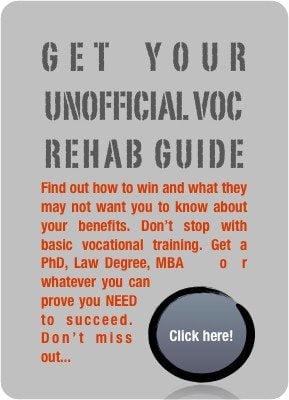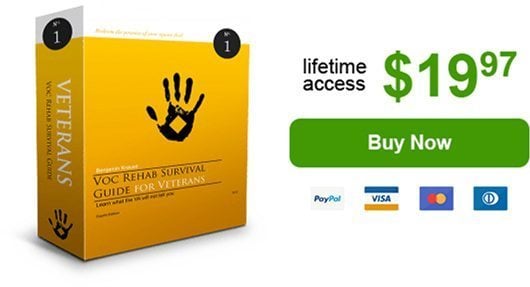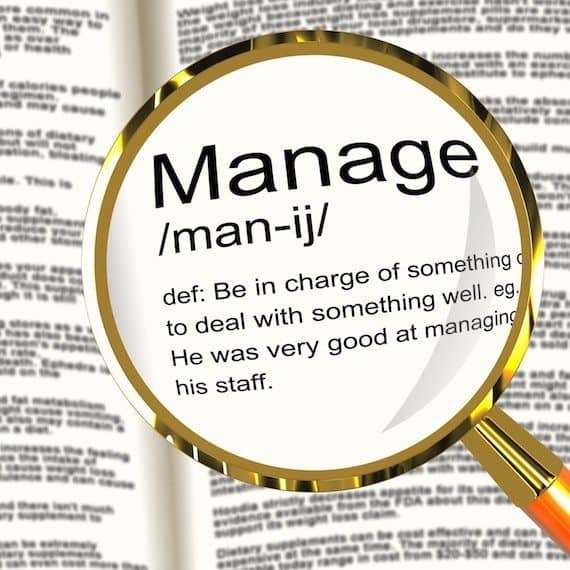#1 Unofficial Guide – VA Vocational Rehabilitation
Cliff Notes from the Voc Rehab Survival Guide
Here’s what they should be telling you:
If you’re one of thousands of disabled veterans reading this, you’re likely looking for help through this crazy Voc Rehab process designed to serve our nation’s disabled veterans. This process, formally called Chapter 31 Vocational Rehabilitation and Employment (VR&E), has the least amount of published information of all Department of Veterans Affairs programs on the web, from what I can tell. Read on and you’ll get your square deal from Voc Rehab for your training.
Here’s what this article covers:
- What do I do before my first meeting?
- What will Voc Rehab pay for?
- How much will it pay?
- Where can I go to college?
- What degrees can I get?
- GI Bill versus Chapter 31 Vocational Rehabilitation
For each of these topics, there are “asides” that need some explaining. The links below take you to more detailed information for your benefits claim development.
First: Before that initial meeting, you (the disabled veteran) will need to prepare a basic case supporting what you want to do. Do not go in there with no idea of what you would like to do. It’s probably really annoying to the counselors, but more importantly, it makes you appear directionless. Take the time to sort out what you might want to do for the rest of your life, or at least the next few years. Click here for the Voc Rehab Survival Guide.

Now, you also need to prove to your VRC that you can successfully complete the training. Just walking into the office and declaring you want to be a doctor will not suffice. You will need satisfactory marks on your standardized tests, like SAT, ACT, GMAT, LSAT, etc. These tests will show the counselor you mean business.
There are other ways too, such as doing well at a community college before transferring to a university. Other issues may also play a factor, such as PTSD and anxiety type disorders. Depending on the degree to which you are impacted by these conditions, your VRC may determine your “Limitations” are too great for a particular area of study. For information on how to get around denials given to many disabled veterans, click here.
Third: Vocational Rehabilitation will pay for many things ranging from startup costs to a law degree. The magic limit is $25,000 per year. If you’re rehabilitation plan is more than this, it will require additional approvals. As you can guess, getting additional approvals is very difficult to accomplish. Your “call-to-action” better be spot on. Otherwise, you may get denied and piss off your counselor, should you re-apply.
Fourth: You can attend college anywhere, so long as you can support it with documentation. Things get sticky when disabled veterans want to get a four-year degree or graduate level training paid for. The counselor will balk at the idea of sending any disabled veteran to a private college or university. Voc Rehab is required to provide a training environment that is appropriate for training and the least financial impact to tax payers. This means they are required – so they say – to send you to a public university when a program of study is offered that satisfies the goal of the veteran.
For example, in Chicago, there is the University of Chicago (referred to as just “Chicago” in academic circles) and the University of Illinois – Chicago (called UIC). Chicago is a MUCH better institution than UIC on all levels, especially in areas like Economics and Public Policy. In fact, Chicago is rated 8th nationally, and UIC is Tier 3 (not even in the top 150) – no comparison. Let’s say disabled veteran Bob gets into both for an undergraduate degree. Bob wants to study Economics. Well, both UIC and Chicago have Economics programs. Guess where Bob has to attend? UIC. Now, there’s a little insider secret, or “work around” for the politically correct reader, that is outside of the scope of this discussion. Click here to get around this issue and attend Chicago (or Northwestern, or Stanford, or Harvard), if you want.
Fifth: you can get college degrees in anything that would lead to a job somewhere. The obvious choice would be getting a degree in Business, Information Technology, Engineering, Accounting or something similar. These degrees give you specific job function type skill sets that most companies need. Degrees that do not have specific applicability are English, History, Economics, Art or similar. These degree paths give you general skills such as critical thinking, writing, and problem-solving. The disabled veteran may find the subjects interesting, but she will not know the difference between credit and debit or how to create a Pivot Chart in Excel. An easy solution would be to get a Business major with a minor in History or whatever one chooses. Here is a breakdown of earnings by degree type.
Sixth: should you use the Post 9/11 GI Bill or Chapter 31 Voc Rehab? Great question. I wrote a little blog post for Military.com on the subject. Voc Rehab recipients have been screwed by recent legislation. In it, Senator Akaka and company have decided to discriminate between newly disabled veterans and disabled veterans who exited the military before 9/11. The newly disabled veterans can receive up to $2,800 per month in stipend funds while older disabled veterans in that same region can only receive $570. For disabled veterans with the option to choose, if you attend private school, it’s still probably better to take Voc Rehab. If you are attending a public school, the new GI Bill is the best bet. Click here for the blog explanation.
Feel free to post questions about these six issues or others below.
About Ben Krause: Ben is a disabled veteran from the Bosnia War and served with the U. S. Air Force Special Operations Command in England. He has used Chapter 31 Vocational Rehabilitation twice. The first time, he attended Northwestern University, a premier private university in Illinois. He is currently enrolled at Lewis and Clark College to attend law school. In total, Ben has been found entitled to receive over $250,000 in tuition and fees alone and has successfully appealed against the VA 8 times. Here’s a link to his story.
Email questions to: [email protected].






What types of buinesses will the Voc Rehab approve? I was told by a friend the types are generally ‘Brick and Mortar’ business; I’m looking at starting a production company (feature films), which may be considered a hobby. Also, are there any indepth books or guides regarding this?
First off i could care less if the “counselor” gets pissed off! that their job if they cannot handle it, then maybe they should look for a different job!!! Second this is an entitlement that we the vetrans earned. It would be who’s of you to ask all questions. Third the counselor should infact, make sure the veteran understands everything that is needed from them!!!
What happens if they don’t want to fund you anymore and they say it was unsuccessful? Does it just make them look bad and affect their statistics or will they actually try to figure out why?
Spot on. I wanted to work in human services. Primarily with teens to possibly start my own program to create jobs for kids. I followed the rules that you have outlined and had a great experience through the Voc Rehab program. The only thing that i told the counselor was that i didn’t learn of the program until later on in life and that many vets may may not be aware of these benefits. That was in 1998. Just the same it was a great experience. Don’t go to play.
What if you got out 1/31/1975 And they lost your service and medical records 2 days before you get out & they say we’ll find them and then you can reapply for a medical discharge. I WAS STUPID! Now i am getting a non service connected disability rating of 100%. You can exist on it since I own my own place, but you can’t live on it BROKE, DISGUSTED , & TIRED OF THE B.S. YA’LL HAVE A GOOD DAY!